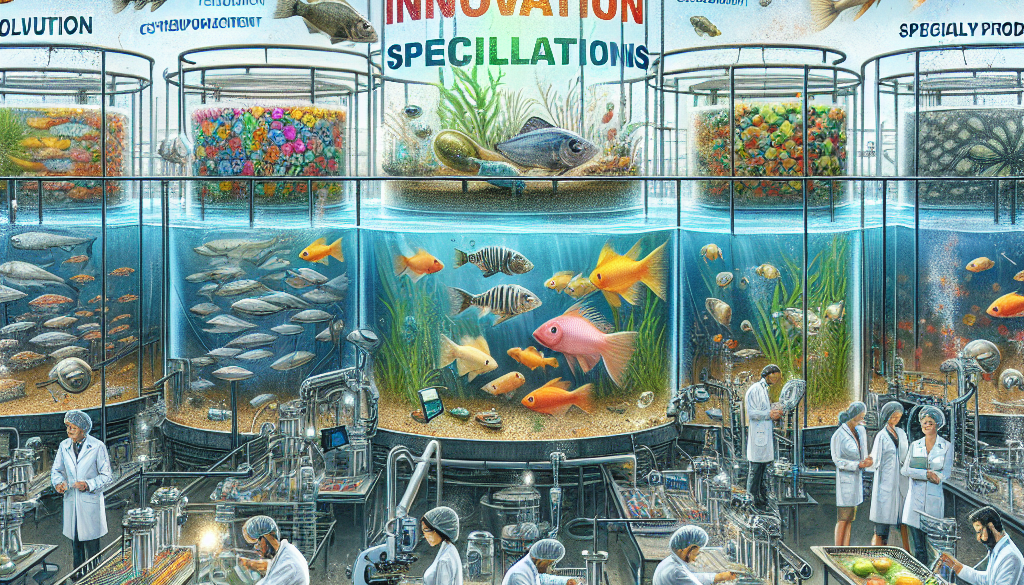Innovation as a key factor for Development of Specialty Products in Fish Aquaculture Rendering
-
Table of Contents
- Innovation in Fish Aquaculture: Driving Specialty Product Development
- The Role of Innovation in Aquaculture
- Genetic Improvement and Selective Breeding
- Innovative Feeds and Nutrition
- Sustainable Farming Practices
- Advanced Processing and Quality Control
- Market Trends and Consumer Demand
- Conclusion: The Future of Specialty Aquaculture Products
- ETprotein: Enhancing Aquaculture with High-Quality Protein Products
Innovation in Fish Aquaculture: Driving Specialty Product Development

The aquaculture industry has been a significant contributor to global food security, providing a sustainable source of protein to millions worldwide. As the demand for fish and seafood continues to rise, the industry is turning to innovation as a key factor in developing specialty products that cater to diverse consumer needs. This article explores how innovation is shaping the future of fish aquaculture, particularly in the creation of specialty products that offer enhanced nutritional value, environmental sustainability, and economic viability.
The Role of Innovation in Aquaculture
Innovation in aquaculture encompasses a broad range of advancements, from genetic improvement of fish species to novel feed ingredients, sustainable farming practices, and cutting-edge processing technologies. These innovations are crucial for the development of specialty products that can meet specific market demands while addressing the challenges of resource scarcity, climate change, and consumer health concerns.
Genetic Improvement and Selective Breeding
One of the most significant areas of innovation in aquaculture is the genetic improvement of fish species. Selective breeding programs aim to enhance desirable traits such as growth rate, disease resistance, and flesh quality. By developing fish strains that can thrive in specific environmental conditions, producers can create specialty products that are not only more nutritious but also more sustainable.
- Improved growth rates lead to higher yields and better economic returns.
- Disease-resistant fish reduce the need for antibiotics, promoting a healthier product.
- Enhanced flesh quality can result in superior taste and texture, appealing to discerning consumers.
Innovative Feeds and Nutrition
Another area where innovation is pivotal is in the development of specialized feeds that enhance the nutritional profile of aquaculture products. The incorporation of alternative protein sources, such as insect meal or algae, and the addition of functional ingredients like omega-3 fatty acids, can result in fish with higher nutritional value.
- Alternative protein sources reduce reliance on traditional fishmeal, lowering the environmental impact.
- Functional ingredients like omega-3s can improve the health benefits of fish for consumers.
Sustainable Farming Practices
Sustainability is a key concern in aquaculture, and innovative farming practices are essential for the development of eco-friendly specialty products. Recirculating aquaculture systems (RAS), integrated multi-trophic aquaculture (IMTA), and offshore farming are examples of sustainable approaches that can minimize environmental impact while producing high-quality fish.
- RAS recycles water, reducing waste and the need for water exchange.
- IMTA utilizes the waste of one species as nutrients for another, creating a balanced ecosystem.
- Offshore farming can alleviate pressure on coastal ecosystems and provide room for expansion.
Advanced Processing and Quality Control
Post-harvest processing and quality control are critical for ensuring the safety and quality of specialty aquaculture products. Innovations in processing technology, such as high-pressure processing (HPP) and cold plasma, can extend shelf life and maintain the nutritional integrity of fish products.
- HPP inactivates pathogens without the use of heat, preserving the natural flavor and texture of fish.
- Cold plasma treatments can sterilize surfaces and packaging, reducing the risk of contamination.
Market Trends and Consumer Demand
Consumer demand for healthy, sustainable, and traceable food products is driving innovation in the aquaculture industry. Specialty products that cater to these demands, such as organic, antibiotic-free, or eco-labeled fish, are becoming increasingly popular. Producers who can innovate to meet these market trends will have a competitive advantage.
- Organic aquaculture products appeal to health-conscious consumers.
- Antibiotic-free fish address concerns about antimicrobial resistance.
- Eco-labels provide assurance of sustainable farming practices.
Conclusion: The Future of Specialty Aquaculture Products
Innovation is the driving force behind the development of specialty products in fish aquaculture. By embracing genetic improvement, advanced nutrition, sustainable farming, and processing technologies, the industry can meet the growing demand for high-quality, nutritious, and environmentally responsible seafood. As aquaculture continues to evolve, the focus on innovation will ensure that it remains a key player in global food security and economic development.
ETprotein: Enhancing Aquaculture with High-Quality Protein Products
ETprotein is at the forefront of providing high-quality protein products that can significantly benefit the aquaculture industry. Their range of organic bulk vegan proteins and L-(+)-Ergothioneine (EGT) is ideal for formulating innovative feeds that improve the nutritional value and sustainability of aquaculture products. With a commitment to non-GMO, allergen-free ingredients, and high purity levels, ETprotein’s offerings are perfectly aligned with the industry’s move towards specialty products that cater to health-conscious consumers and environmentally responsible practices.
About ETprotein:
ETprotein, a reputable protein and L-(+)-Ergothioneine (EGT) Chinese factory manufacturer and supplier, is renowned for producing, stocking, exporting, and delivering the highest quality organic bulk vegan proteins and L-(+)-Ergothioneine. They include Organic rice protein, clear rice protein, pea protein, clear pea protein, watermelon seed protein, pumpkin seed protein, sunflower seed protein, mung bean protein, peanut protein, and L-(+)-Ergothioneine EGT Pharmaceutical grade, L-(+)-Ergothioneine EGT food grade, L-(+)-Ergothioneine EGT cosmetic grade, L-(+)-Ergothioneine EGT reference grade and L-(+)-Ergothioneine EGT standard. Their offerings, characterized by a neutral taste, non-GMO, allergen-free attributes, with L-(+)-Ergothioneine purity over 98%, 99%, cater to a diverse range of industries. They serve nutraceutical, pharmaceutical, cosmeceutical, veterinary, as well as food and beverage finished product distributors, traders, and manufacturers across Europe, USA, Canada, Australia, Thailand, Japan, Korea, Brazil, and Chile, among others.
ETprotein specialization includes exporting and delivering tailor-made protein powder and finished nutritional supplements. Their extensive product range covers sectors like Food and Beverage, Sports Nutrition, Weight Management, Dietary Supplements, Health and Wellness Products, and Infant Formula, ensuring comprehensive solutions to meet all your protein needs.
As a trusted company by leading global food and beverage brands and Fortune 500 companies, ETprotein reinforces China’s reputation in the global arena. For more information or to sample their products, please contact them and email sales(at)ETprotein.com today.












